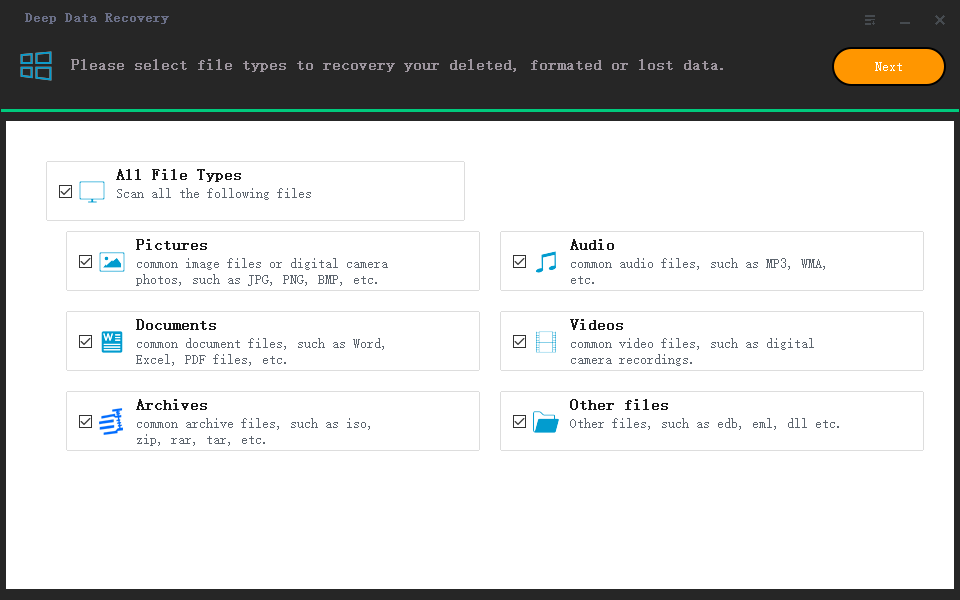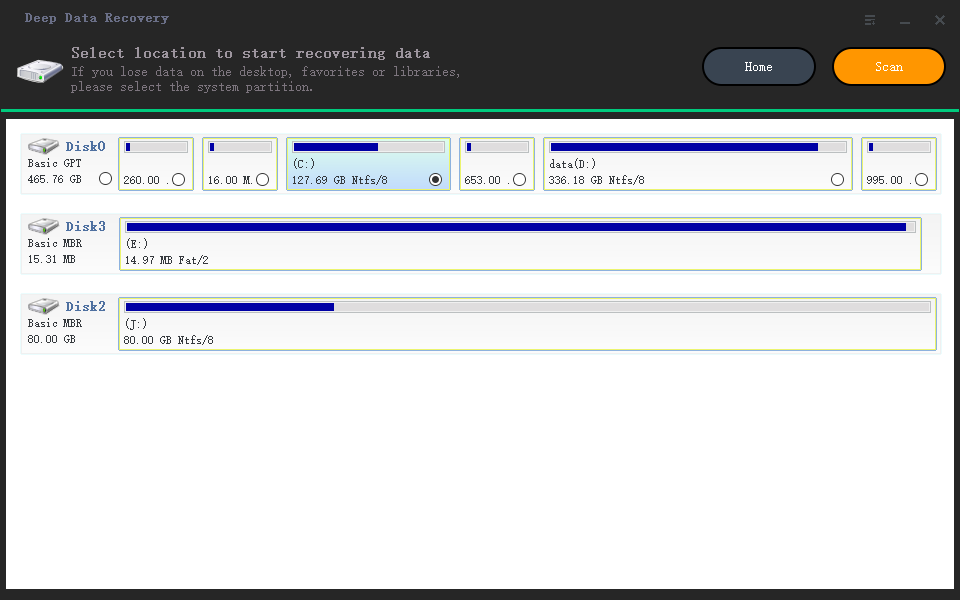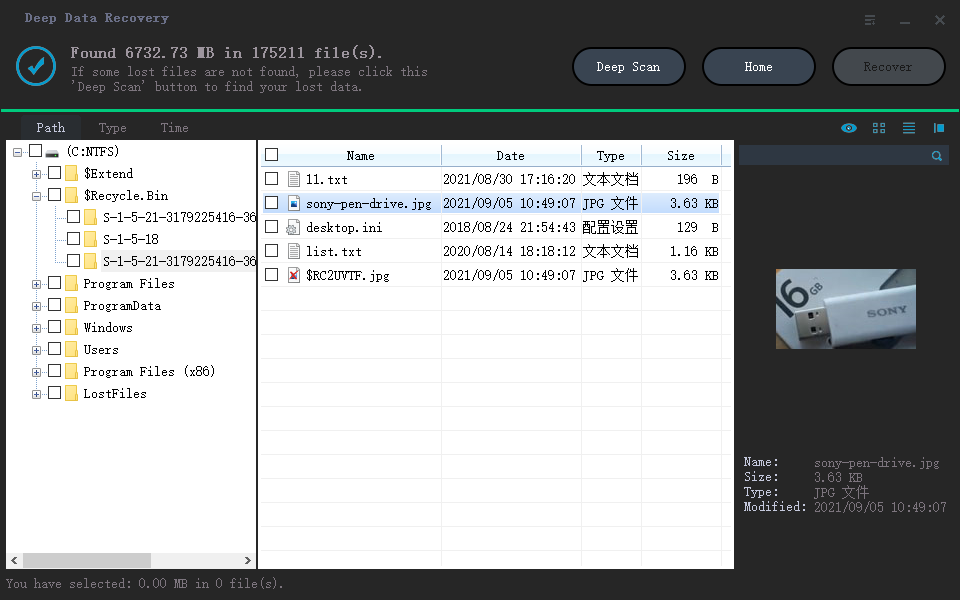HP USB Flash Drive Recovery | How to Recover Files from HP USB Flash Drive
Quick Navigation:
- Scenarios or the reasons for loss of data loss from HP USB flash drive
- Best Tool to Retrieve Data from HP USB Flash Drive
- Guide to Perform HP USB Flash Drive Recovery on Windows/Mac
- 1. Selecting the file type
- 2. Selecting a location
- 3. Preview and recover HP USB flash drive
HP's USB flash drive is a convenient option for carrying data. It offers both security and capacity, making it a worthwhile investment. With the latest technology, data transfer speeds are fast, allowing users to quickly copy files from any PC or laptop.
HP USB flash drives offer several advantages over other external drives, including convenience, portability, and ease of use. They are compact and lightweight, making them easy to carry around, and can be plugged directly into a computer's USB port without the need for additional power sources or cables.
- 1. The USB product is portable and compact, fitting in a thumb size, making it easy to carry. It also operates independently, not requiring an additional power supply, and consumes minimal power.
- 2. The data transfer rate in USB flash drives is typically high, with the speed depending on the technology used by the company, but generally faster than other options.
- 3. The HP USB flash drive operates normally in various weather conditions. Nevertheless, it's essential to keep it away from liquid spills, as they can cause a short-circuit when connected to a computer or potentially damage the device.
- 4. Any operating system can easily recognize a flash drive on any model of a computer or laptop.
- 5. To safeguard the data on a flash drive, one can encrypt the data and assign a password, making it more difficult for unauthorized individuals to access the information.
- 6. The availability of storage space is wide-ranging, allowing users to select the amount that suits their needs.
- 7. The external drives are available at highly affordable prices, making them competitive in the market.
Scenarios or the reasons for loss of data loss from HP USB flash drive
While the reasons for data loss on a flash drive may vary, there are some common factors that affect how people handle the situation. These include situations where data is lost due to physical damage, accidental deletion, or corruption, which are often the same for everyone. In such cases, the approach to recovering data from the flash drive tends to be similar, regardless of the individual's circumstances.
- 1. Deleting files from an HP USB flash drive or formatting it for recovery on HP flash memory or other devices.
- 2. Flash drives can function for an extended period and under harsh conditions, but improper handling and continuous use of the same can make them prone to damage after a certain period. The exact timing of this damage is unpredictable.
- 3. Disasters caused by mother nature, such as earthquakes and cyclones, pose a significant danger without warning, prioritizing personal and family safety over protecting electronic products. Even if a flash drive survives, recovering data can be difficult.
- 4. Most people remove the drive immediately after data transfer, unaware that there's a proper procedure to do so safely, which helps prevent data corruption and loss.
Best Tool to Retrieve Data from HP USB Flash Drive
HP USB flash recovery requires a program that can easily analyze all sectors and recover maximum data. Deep Data Recovery software is a great option, making HP recovery flash drive a simple process.
Deep Data Recovery uses an advanced algorithm to help recover data from an HP recovery USB flash drive. The software scans thoroughly and deeply before displaying the content it can retrieve, providing a maximum potential for data retrieval.
Your Safe & Effective HP USB Flash Recovery Program
- The software is designed to recover data from HP USB flash drives that have been deleted, formatted, or are displaying errors, such as being unreadable or showing a RAW format, due to intentional or accidental deletion, formatting, or other unknown reasons.
- HP flash recovery helps in recovering data from HP USB flash drives that have been deleted, formatted, or are displaying errors such as RAW format or being inaccessible/unreadable.
You can download the HP USB Flash Recovery Program by clicking on the provided download link.
The software is capable of identifying multiple file formats and supports a wide range of storage drives, including computers, laptops, HDDs, external HDDs, SSDs, flash drives, memory cards, and more.
Guide to Perform HP USB Flash Drive Recovery on Windows/Mac
HP flash recovery is a simple procedure that can be performed with the help of a USB file recovery tool. Even a novice can accomplish this task with ease. Before proceeding, it's essential to install the trial version available from the website of the tool. After installation, follow these steps: [insert steps].
1. Selecting the file type
HP flash memory recovery involves selecting the desired file type to recover using the recovery tool. Upon launching the software, the primary screen displays various file formats that can be recovered, with all options marked by default. Users can then choose the required file type or types and proceed to the next step by clicking the "Next" button.

2. Selecting a location
After choosing the desired file format, the tool requires selecting the location where the data will be retrieved. The screen displays all available locations, including the connected HP USB flash drive. To initiate the scan, select the flash drive as the scanning location and press the "Scan" button, allowing the HP external hard drive data recovery or restore HP USB drive tool to begin the scan process.

3. Preview and recover HP USB flash drive
The Windows or Mac HP USB flash drive recovery tool scans the drive and displays the results in a new window. You can select the file format or folders from the tree directory to the left, view the available files in the center, and see a thumbnail of a selected file to the right. Based on the preview, you can mark the important data, choose a saving destination, and click "Recove" to start the recovery process.

The undelete or unformat flash drive tool offers a Deep Scan mode that allows for a thorough search of the drive for missing data. This process can be time-consuming as it scans the drive sector-by-sector, but it may be necessary when a significant amount of information is believed to be left behind on the USB flash drive.
Related Articles
- How to Recover Files from USB Flash Drive
- How to Recover RAW Photos from Digital Camera/Other Drive
- Unformat USB Drive - How to Recover Formatted Files from USB
- WD My Cloud Recovery - How to Recover Data from WD My Cloud Hard Drive
This article is a step-by-step guide for data recovery for WD My Cloud. Two parts are covered, one is how to recover data from damaged WD My Cloud drive. Another one is how to retrieve files from WD My Cloud with Deep Data Recovery software. - How to Recover Data from a Wiped Hard Drive on Windows PC/Mac
Data recovery from wiped hard drive on Windows PC or Mac, if you can do it soon, then you'll recover data from wiped or reset hard drive easily. Free download the wiped hard drive data recovery software to do it. - How to Recover DCIM Folder from SD Card
Some people asked how to recover DCIM folder from SD card on Mac or Windows. Sometimes, the DCIM folder disappears without any notice.